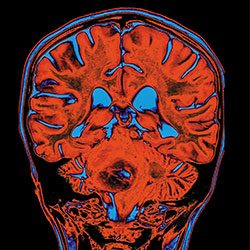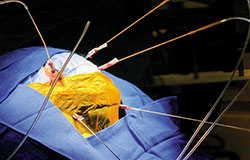Innovations at a Glance
Parallel programs in neurology and neurosurgery at NewYork-Presbyterian/Columbia University Irving Medical Center and NewYork-Presbyterian/Weill Cornell Medical Center strengthen and extend our ability to offer the most advanced technologies, newest therapies, and interdisciplinary approaches for the most challenging brain, neurological, and spinal disorders.

- Demonstrated in an animal model that a pump implanted in the abdomen to deliver a chronic infusion of a drug was successful in killing glioma cells and is now being tested in humans
- Participated in a multicenter clinical trial investigating a novel combination approach of an adenovirus plus an immune checkpoint inhibitor for treatment of recurrent glioblastoma or gliosarcoma
- Isolated two specific proteins in the microglia implicated in Alzheimer’s disease and subsequently identified small molecules with therapeutic potential that would involve disrupting the binding of these proteins
- Further advanced the application of high-intensity focused ultrasound for essential tremor and tremor-dominated Parkinson’s disease, with additional studies underway for non-invasively delivering gene therapies to the brain
- Investigated new methods to treat refractory epilepsy, including MR-guided laser interstitial thermal ablation
- Conducted a preliminary study indicating that close analysis of EEG data revealed that nearly 1 in 7 brain-injured ICU patients showed evidence of hidden consciousness just days after injury and may help predict recovery potential
- Evaluated the capability of Gleolan to distinguish residual tumors from normal brain matter during surgery for high-grade glioma
- Pioneered middle meningeal arterial embolization for symptomatic chronic subdural hematoma as upfront treatment in lieu of surgical evacuation when conservative management has failed

- One of only four sites in the United States using the ROSA neurosurgical robot as part of a clinical trial to administer gene therapy to children with mucopolysaccharidosis type IIIA, a rare congenital disorder



